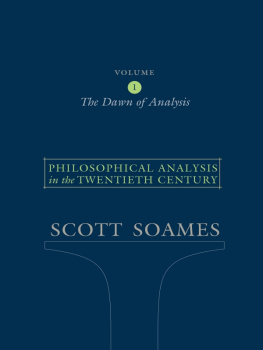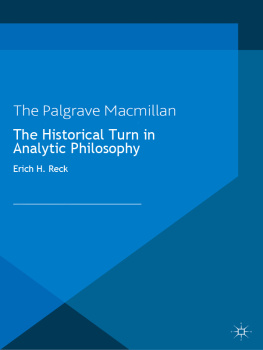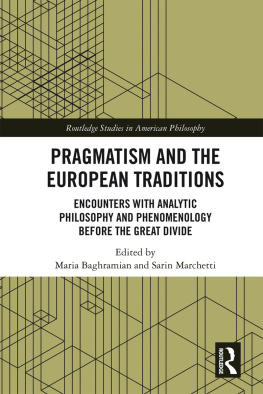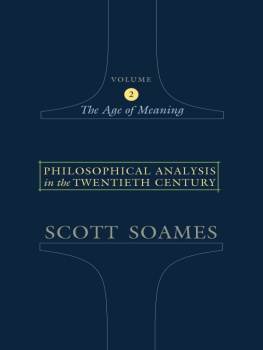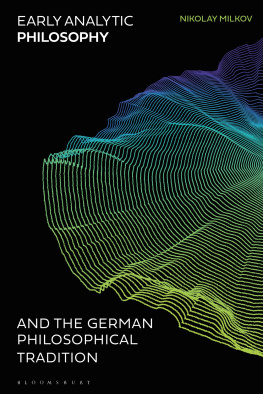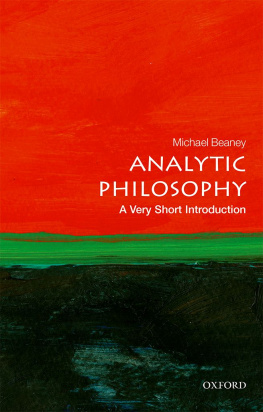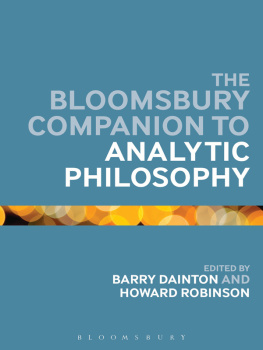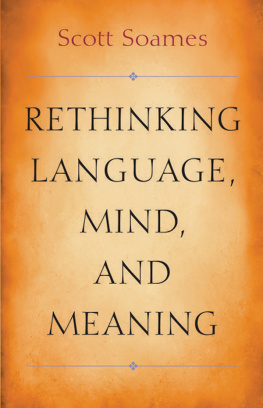PHILOSOPHICAL ANALYSIS
IN THE TWENTIETH CENTURY
PHILOSOPHICAL ANALYSIS in the TWENTIETH CENTURY
VOLUME 1
THE DAWN OF ANALYSIS
Scott Soames
PRINCETON UNIVERSITY PRESS
PRINCETON AND OXFORD
Copyright 2003 by Princeton University Press
Published by
Princeton University Press,
41 William Street,
Princeton, New Jersey 08540
In the United Kingdom:
Princeton University Press,
3 Market Place,
Woodstock, Oxfordshire OX20 1SY
All Rights Reserved
eISBN:978-1-40082-579-0
British Library Cataloging-in-Publication Data is available
Library of Congress Cataloging-in-Publication Data
Soames, Scott.
Philosophical analysis in the twentieth century/Scott Soames.
p. cm.
Includes bibliographical references and index.
Contents: v. 1. The dawn of analysis.
eISBN: 978-1-40082-579-0
1. Analysis (Philosophy) 2. MethodologyHistory20th century. 3. PhilosophyHistory20th century. I. Title.
B808.5 .S63 20032002042724
146'.4dc21
This book has been composed in Galliard
Printed on acid-free paper.
www.pupress.princeton.edu
Printed in the United States of America
10 9 8 7 6 5 4 3 2 1
THIS VOLUME IS DEDICATED
TO MY SON
GREG
CONTENTS
ACKNOWLEDGMENTS
THE TWO VOLUMES of this history grew out of two lecture courses given at Princeton University, the one that led to the first volume for a period of many years, the one that spawned the second in 1998, 2000, and 2002. The idea for the volumes was originally suggested to me by my one-time student, now friend and professional colleague, Jonathan Vogel, on a walk across the Brooklyn Bridge one hot summer evening sometime in the mid-nineties. The genesis of the volumes in the courses in reflected both in the topics taken up, and in the level at which they are discussed. Although the origin of the work has resulted in omissions of some philosophically important technical materiale.g., from Frege, Tarski, Carnap, and Kripke (which I hope to cover in later work)it has also made for a more widely accessible finished product. All the material in these volumes has been presented to upper-division undergraduates and beginning graduate studentsa fact which, I would like to think, has led to an emphasis on large, comprehensible themes with a minimum of inessential detail.
I am grateful to four people for reading and commenting on the manuscript for volume 1my Princeton colleague, Mark Greenberg, my longtime friend and philosophical confidant, Ali Kazmi, a reader for the Princeton University Press, John Hawthorne, and my student, Jeff Speaks. All four read the manuscript carefully and provided me with detailed and helpful criticisms. In addition to discussing important philosophical issues with me, Jeff played a large role in helping to produce the manuscript, and in making significant stylistic suggestions, such as the outline at the beginning of each chapter. Finally, I would like to thank my editor at the Press, Ian Malcolm, for his stewardship of the volumes, and Martha Dencker for her encouragement and understanding, which helped speed my work on the project.
INTRODUCTION TO THE TWO VOLUMES
THIS WORK presents an introductory overview of the analytic tradition in philosophy covering roughly the period between 1900 and 1975. With a few notable exceptions, the leading work in this tradition was done by philosophers in Great Britain and the United States; even that which wasnt written in English was, for the most part, quickly translated, and had its greatest impact in the world of English-speaking philosophers. Fortunately, the philosophy done in this period is still close enough to speak to us in terms we can understand without a great deal of interpretation. However, it has begun to recede far enough into the past to become history. Looking back, we are now in a position to separate success from failure, to discern substantial insights, and to identify what turned out to be confusions or dead ends. The aim of this work is to do just that. This will involve not only explaining what the most important analytic philosophers of the period thought, and why they thought it, but also arguing with them, evaluating what they achieved, and indicating how they fell short. If the history of philosophy is to help us extend the hard-won gains of our predecessors, we must be as prepared to profit from their mistakes as to learn from their achievements.
To my mind the two most important achievements that have emerged from the analytic tradition in this period are (i) the recognition that philosophical speculation must be grounded in pre-philosophical thought, and (ii) the success achieved in understanding, and separating one from another, the fundamental methodological notions of logical consequence, logical truth, necessary truth, and apriori truth. Regarding the former, one of the recurring themes in the best analytic work during the period has been the realization that no matter how attractive a philosophical theory might be in the abstract, it can never be more securely supported than the great mass of ordinary, pre-philosophical convictions arising from common sense, science, and other areas of inquiry about which the theory has consequences. All philosophical theories are, to some extent, tested and constrained by such convictions, and no viable theory can overturn them wholesale. Analytic philosophers are, of course, not the only philosophers to have recognized this; nor, as we shall see, have they always been able to resist the seductions of unrestrained, and sometimes highly counterintuitive, theorizing. Still, the tradition has had a way of correcting such excesses, and returning to firmer foundations. Regarding (ii), no philosophical advance of the twentieth century is more significant, more farreaching, and destined to be more long-lasting than the success achieved in distinguishing logical consequence, logical truth, necessary truth, and apriori truth from one another, and in understanding the special character of each. The struggle that led to this success was long and arduous, with many missteps along the way. But the end result has transformed the philosophical landscape in ways that have become apparent only now, when we look back at our great twentieth-century predecessors from a position that they helped us to achieve.
It is a measure of the importance of these achievements that they have reverberated across all areas of philosophy in the analytic tradition. Accompanying them have been significant advances in more specialized areas of philosophy as wellmost notably in the philosophy of logic, the philosophy of language, the philosophy of mind, the philosophy of science, and epistemology. Indeed, the very organization of the subject into separate and specialized areas such as these is, in part, a product of the analytic tradition. With this organization has come increasing interaction between philosophers with specialized interests and theorists in related fields. This interaction has, in turn, fed a number of important intellectual developments. One of the most striking of these involves the growth and development of symbolic logic into a largely autonomous discipline with important philosophical applications, and significant interest to philosophy. A second involves the emergence of modern linguistics and the scientific study of the natural languages, to which developments in the philosophy of language and logic have made, and continue to make, significant contributions.
Despite the engagement of analytic philosophers with important scientific and mathematical developments in the twentieth-century, the analytic tradition in philosophy has often been misunderstood by those outside the field, especially by traditional humanists and literary intellectuals. One persistent misconception has been to think of analytic philosophy as a highly cohesive school or approach to philosophy, with a set of tightly knit doctrines that define it. As the reader of these volumes will see, at various times in its history, analytic philosophy has contained within it systems and movements that did purport to have more or less the final truth about philosophy in general, philosophical methodology, or the nature of analysis; or about some large area within the subject. However, none of these systems or movements formed the basis of any lasting consensus. Invariably, the harshest and most effective opponents of any analytic philosopher have always been other analytic philosophers. In some cases, the harshest criticism has been self-criticism. One movementlogical positivismis widely regarded to have been refuted by its own proponents. As chronicled in volume 1, the logical positivists articulated their basic conception, formulated it in terms that were clear and precise enough to allow it to be tested, and then found counter-arguments that in the end undermined it. Events like these, which constitute real progress, are unfortunately far too rare in the history of philosophy. For that reason, the rise and fall of logical positivism is viewed by many philosophers today as a proud chapter in the analytic tradition.
Next page
